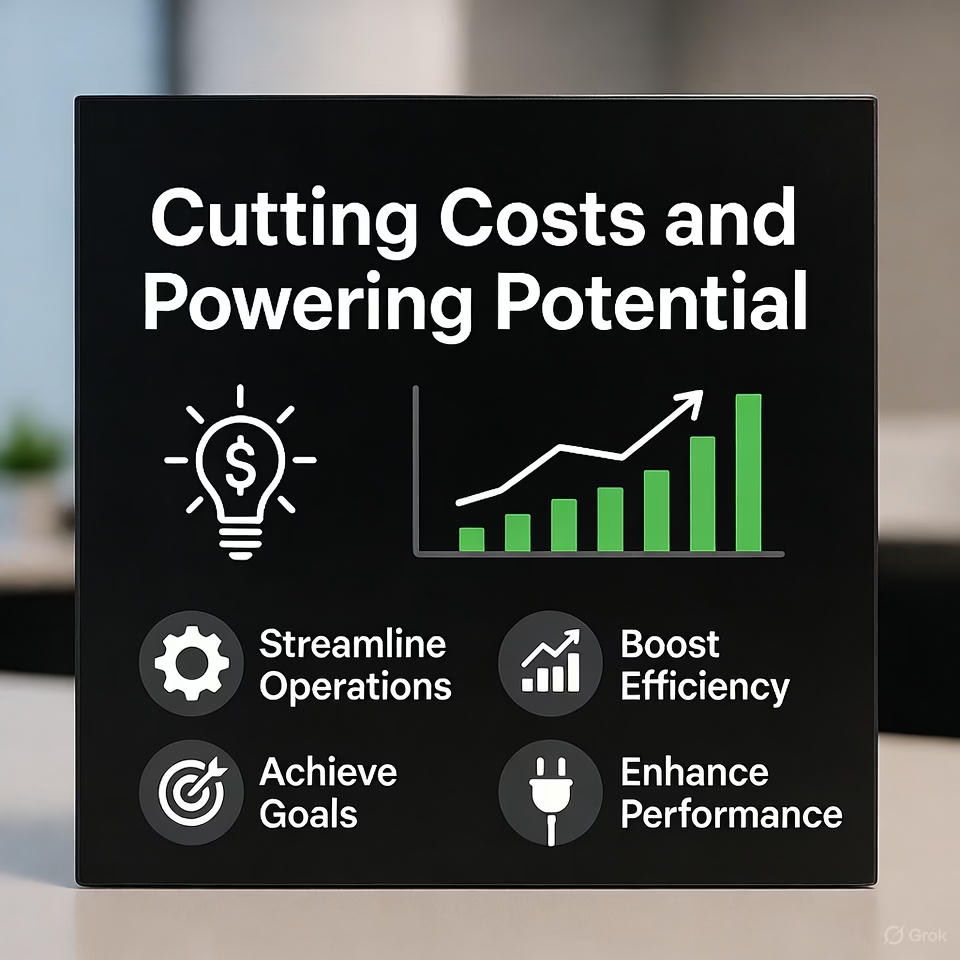In today’s fast-paced business environment, managing costs isn’t just prudent it’s essential. Among the many expenses that can quietly erode profit margins, the cost of electricity often doesn’t get the spotlight it deserves. For companies operating in Texas, which offers one of the most competitive and deregulated electricity markets in the U.S., understanding how to secure the best electricity rates for business can be a game-changer.
Why electricity rates matter for businesses
Electricity is a foundational cost for businesses of all sizes from small retail shops and offices to manufacturing plants and data centers. Whether you’re running lights, HVAC systems, computers, refrigeration, or heavy machinery, your business relies on power. A few tenths of a cent per kilowatt-hour (kWh) difference in rate can translate into thousands of dollars over a year.
In Texas, commercial rates tend to be significantly lower than the national average. Because of deregulation, businesses in Texas have the option to choose their retail electric provider (REP) and contract terms opening the door to savings, but also introducing complexity.
Therefore, when you’re focused on the best electricity rates for business, you’re not just looking at the lowest advertised number you’re looking at how that rate fits your usage profile, your contract term, and your risk tolerance.
The Texas advantage: deregulation and competitive choice
Texas stands out among U.S. states because many business customers operate in deregulated markets. That means your business is not locked into one utility’s default rate; instead, you can shop among multiple REPs for competitive offers.
What does this mean in practice?
- You can compare and select plans tailored for commercial customers, often defined by your monthly usage, meter type, and contract length.
- You have the potential to lock in a fixed rate for a specified term (e.g., 12, 24, 36 months) rather than being subject to variable market swings.
- Delivery (transmission & distribution) charges remain with the regulated utility and don’t vary based on your choice of REP, but energy-supply rates do. Understanding your “energy only” rate becomes critical.
All these factors make Texas an ideal case study for businesses seeking the best electricity rates for business but also a situation that requires informed decision-making.
What affects your business electricity rate
Finding the lowest rate is only half the job. To truly secure the best rate for your business, you must understand the key variables that impact pricing. Here are six major factors:
- Usage volume and pattern
Large consumers typically get better per-kWh pricing because their load is more predictable and their risk to the supplier is lower. Knowing your monthly and annual usage (in kWh) and your peak demands gives you a strong negotiating position. - Load factor
Load factor is the ratio of your average usage to your maximum usage during a period. Businesses with high load factor (consistent usage) often secure better terms. If your business has large fluctuations, your supplier may charge more. - Location and utility service area
Within Texas, rates vary by delivery zone, local market conditions, and demand. Make sure you compare offers specific to your ZIP code and your transmission/distribution utility. - Contract length and rate type
- Fixed-rate contracts lock in a price per kWh for the term, offering price predictability.
- Variable or indexed rates may start lower but carry higher risk if wholesale costs rise.
Depending on your business’s risk tolerance and budget planning needs, one may suit better than the other.
- Timing and market conditions
Electricity markets reflect wholesale supply, fuel costs, and seasonal demand. Because of this, timing when you lock in a rate matters. Shopping ahead of your contract expiration (e.g., 3–6 months before) can open access to better switching or renewal terms. - Plan fine print and pass-throughs
Don’t assume the lowest advertised rate is truly lowest cost. Some plans may have hidden fees, early termination fees (ETFs), or pass-through charges. Always review the contract disclosures carefully.
Steps to find the “best electricity rates for business”
Here’s a step-by-step guide tailored to businesses in Texas to help identify and secure the most cost-effective electricity plan:
Step 1: Gather your usage history
Pull your past 12 months of usage data (kWh by month), peak demand, and meter type(s). Knowing how much you consume and when you consume it gives you insight to compare apples-to-apples across offers.
Step 2: Identify your business’s load profile
Are you a retail shop operating nights and weekends, or a manufacturing plant running 24/7? Do you have high peaks or steady baseline use? The better you understand this profile, the more accurately you can match plan types.
Step 3: Understand your renewal timeline
If you’re currently under contract, note when it expires. Start shopping 3–6 months ahead of that date to give yourself time to compare without being rushed.
Step 4: Compare energy-supply rates and plan types
Evaluate multiple REPs and plan structures. Focus not only on rate (¢/kWh) but also contract term, early termination fees, and whether the rate is fixed or variable. Some business plans in Texas list rates as low as ~6¢/kWh for short-term offers under certain conditions.
Step 5: Review the full cost including delivery, fees, and your business’s operational costs
While you cannot change the delivery (TDU) charge much, factor it into the total cost of electricity per month. Also, evaluate whether operational changes can bring down your usage profile.
Step 6: Negotiate or engage an energy broker if applicable
If you are a large user, you may be able to negotiate custom terms with REPs. Working with a knowledgeable broker or consultant can give you access to rates that may not be advertised broadly.
Step 7: Choose and enroll, and monitor usage throughout the contract
After selecting the best plan, enroll in a timely fashion so you don’t lose access to the rate. Monitor your usage and billing closely to ensure the rate you locked in is being applied.
Real-world benchmarks: What are good rates in Texas?
While your ideal rate will depend on your usage and contract conditions, here are some reference figures:
- Average commercial electricity rate in Texas is approximately 8.6¢/kWh for business energy only.
- Some comparison sites list even lower rates (e.g., 6–7¢/kWh) under favorable short-term contracts or specific load conditions.
- Businesses should consider anything significantly below ~8¢/kWh as a strong candidate for the “best electricity rates for business,” assuming the service conditions suit their needs.
Common pitfalls to avoid
Even in a competitive market, businesses can fall into traps that negate savings or create unexpected costs. Here are some red flags:
- Over-focusing on the lowest rate without matching your usage profile: A great rate for a business that uses power mostly overnight won’t benefit one whose peak hours are daytime and heavy-load.
- Ignoring the contract term and early termination fees (ETFs): A short-term fixed rate can look great but if you’re locked into a long term when you might relocate or expand, you could face high costs later.
- Not checking for plan exclusions or fine print: Some “business” plans may exclude certain meter types or carry higher minimum usage requirements.
- Failing to plan for rate renewal or switching: When your contract ends, the default renewal may carry higher rates. Proactive shopping at the end of term is vital.
- Ignoring energy efficiency opportunities: Sometimes, the best “rate” still leaves savings on the table because you didn’t reduce consumption or shift use.
Why partnering with a broker may help
Given the number of variables usage profile, contract terms, supplier risk, delivery zones it can be challenging for a business owner to navigate all the options. A specialized energy broker or consultant can:
- Analyze your usage data to create a benchmarking model
- Source and solicit offers from multiple REPs tailored to your profile
- Negotiate contract terms (including exit fees, pass-throughs, etc.)
- Offer insights into market conditions and timing considerations
- Provide ongoing usage monitoring and alert you when it’s time to renegotiate
Final thoughts: Aligning rate strategy with business strategy
Securing the best electricity rates for business isn’t just about being cheap it’s about aligning your electricity costs with your broader business goals. Here’s how to tie it all together:
- Budget stability: Fixed-rate contracts offer predictable cash flow.
- Flexibility and growth: Shorter terms or variable-rate options may suit businesses expecting expansion.
- Efficiency and sustainability: Combine competitive supply rates with energy-efficiency initiatives.
- Risk management: Consider electricity as part of your overall risk portfolio.
- Continuous evaluation: Markets change, usage changes, your business changes make provider/plan reviews a recurring item on your operations calendar.
With informed choices and careful planning, businesses in Texas can harness deregulation to secure the best electricity rates for business, lowering costs and powering their potential.






